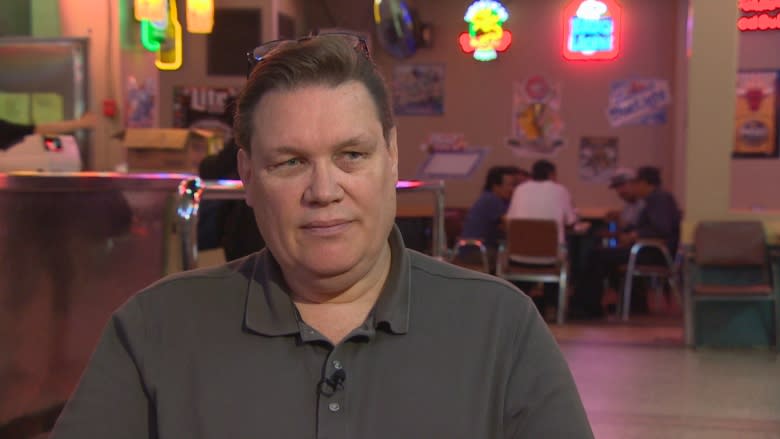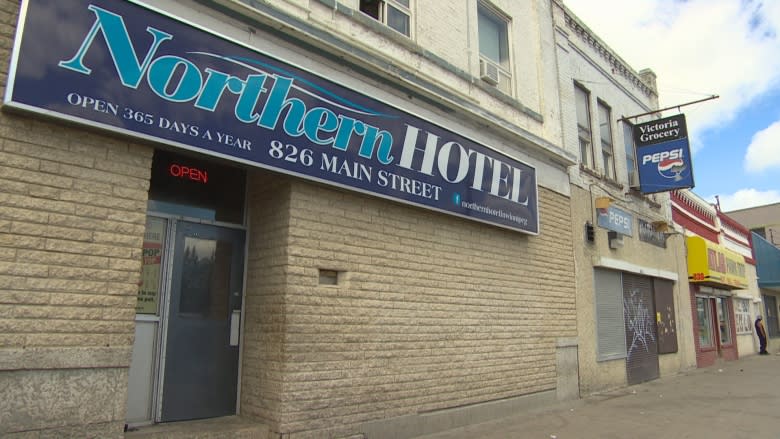Senior with disability ejected from Main Street bar wins human rights complaint
A Winnipeg man says a North End bar discriminated against him due to his disability by refusing him service and telling him he had to leave earlier than everyone else.
The manager of the bar, however, says the policy protects the vulnerable.
Ralph McKenny, 77, has been going to the Northern Hotel bar on Main Street on and off since 1985. The Winnipeg senior, widely known as 'Suzuki' in the area for his resemblance to environmental activist David Suzuki, uses a cane to walk because of a back and spinal injury.
It was 12:40 a.m. on Aug. 1, 2015 when he says he got to the Northern Hotel to hear the live band after a night of karaoke at the nearby Yale hotel. The bar closes at 2 a.m., but McKenny says a waitress and bartender approached to tell him he'd have to clear out an hour earlier.
"Because you have a cane. It's Keith's new rule, no exceptions," McKenny recalls of the explanation he got.
Policy is to protect the vulnerable, manager says
Keith Horn, the hotel's manager, says the policy applies to all vulnerable people in the bar.
He says because of the dangers of the area, the difficulty people can have getting a cab late at night and the threat of violence, anyone with a visible disability who is elderly or perceived as vulnerable is asked to leave an hour earlier than everyone else to have a better chance of getting home safely.
"The security person came over and grabbed the beer out of my hand, took me by the arm and says, "Let's go. You're out of here," says McKenny. "He says to have a good night, and I was out the door and that was it."
"I was just stunned. I was like, 'what are you doing? Come on? I didn't do anything. I was just having my drink.'"
The following week, McKenny returned to the Northern Hotel at about 12:30 a.m. with two ladies after a night of karaoke at the Yale. The same waitress came up to the group and reminded him of the policy again, saying he'd have to leave an hour before closing for his own safety. Then the bartender came over.
Ralph McKenny and Keith Horn have opposite views on the hotel bar policy:
"He reaches over the table and he grabs my beer. And I'm not letting go of my beer right? So he's wrestling with me right?" McKenny says his thumb was injured.
"I says leave me alone, what are you doing? He says, "You're not allowed in here. I'll give you your money back."
McKenny reminded the bartender that even still, it was only 12:45, and he wanted his beer back. The bartender returned it. "You're out of here at 1 o'clock."
McKenny says he was embarrassed for being singled out again from the moment he arrived and told, again, that he had to leave.
"He took me by the arm again and took me to the door. Nobody ever says, 'Can we call you a cab or do you have a ride. Or you know. And as soon as I'm out the door I'm not their problem anymore. It's just bye bye Ralph, or, Suzuki."
On August 25, he filed a complaint with the Manitoba Human Rights Commission.
'Leave me alone'
He met with Keith Horn in person to talk about what happened. He says Horn apologized and told him the policy wouldn't be applied to him again. So McKenny went to the Northern Hotel with a female friend on February 3, 2016, but says a waitress questioned him about who he was going home with and whether he had a ride home.
"She just stopped short of saying, "Are you sleeping with her?" he says. "I thought, 'well gee, leave me alone.'"
He had a drink and left at 1 a.m. without incident.
"I'm an easygoing person but to be treated like that, I don't need it," he says.
"You can't go and enjoy yourself if you're thinking about people coming after you and saying you're not allowed to be in here and [expletive] like that. So I just left it alone. I haven't been there and I don't intend to go back there anymore," he says.
Horn and McKenny were not able to settle the complaint through mediation. McKenny sought $5,000 in damages, but says Horn offered him $1,500, which he rejected. The complaint progressed to the investigation stage with the Manitoba Human Rights Commission.
'It's only for safety,' says manager
Horn says the rule is there for the people with walkers, canes, crutches and the elderly who get beat in the rush for cabs and are then susceptible to violence, cold weather, or getting robbed while they wait for rides.
"I'd rather see them get home safely and come back to us another day than put them outside at 2:30 a.m. because of their free will and something happens to them," says Horn.
Case in point is Henry Kipling, he says, a patron of the Northern Hotel bar on Feb. 26, 2016. Kipling walked with a limp and had mobility issues. Kipling died after he was violently assaulted and robbed by two people in separate attacks less than half an hour apart after last call on Feb. 27, 2016.
Horn was working that night and could have sent Kipling home early to give him a better shot at getting a cab, but he had relaxed the policy in light of the complaint.
Kipling and his family had tried in vain that night to catch a cab, but he was attacked and robbed for a final time at around 3 a.m.
"It still bugs me," says Horn. "It's something so miniscule that could've been taken care of."
While he says he is sorry that McKenny felt discriminated against and embarrassed, he'd rather people be upset in the moment in order to return. The policy was reinstated after Kipling's death.
"It's not meant to embarrass you, it's only for safety," says Horn.
"That's bullshit," countered McKenny.
"I'm 77 years old, how did I get along this long if I don't know how to take care of myself, right? And I certainly don't need some bartender or some owner of a bar to tell me, 'hey, it's bedtime!' Is he going to come tuck me in? I don't think so."
The Manitoba Human Rights Commission ultimately found in February that Horn discriminated against McKenny, and others sharing his characteristics, on the basis of disability.
"People with disabilities are being treated more harshly than any other group, in that they must arrange for someone to either accompany them to the bar and/or escort them home in order to continue being served after 1 a.m. and/or stay after closing time," wrote the investigator in her decision.
"This suggests that the policy places an undue burden on people with disabilities/mobility issues, based on the assumption that they cannot make their own way home, or that they would be safer if accompanied by someone else."
The investigation found that although Horn's policy was created with his honest belief it would protect the safety of vulnerable people, it ultimately affects their rights and equality. The matter will now go to adjudication.
Complainant seeks $10K for loss of dignity
Three years after lodging his complaint with the Manitoba Human Rights Commission, McKenny increased his asking price to $10,000.
"I think that he owes me," says McKenny.
He says the money he seeks is for his loss of dignity.
"I've lived through discrimination all my life. It was this time that I decided to stand up."
"I don't know why it's come down to money," shot back Horn.
"If they [MHRC] think I've done something wrong, then they should be telling me, "In the future, you should be doing it this way." he says.
According to the commission, settlements are remedial rather than punitive in nature, with the purpose of educating the public on human rights and discrimination.
Horn says even if he winds up having to pay a fee, he doubts he'll change the policy.
"People need help," he says.
When asked if he'd rather be potentially robbed, abused or left waiting outside of a bar for a cab in order to stay until last call, McKenny replied without hesitation.
"I want to be treated just like everybody else. I'm not going to be kicked out because I have a cane or limp. Any man or any industry can try to rob me of my dignity ... but they'll lose. That's how I feel."





